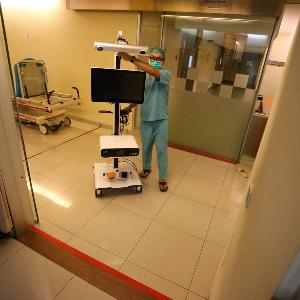Global health and labor migration
12 Aug 2025
The Volkswagen Foundation is funding a project by LMU researcher Julia Lohmann about the shortage of skilled medical workers and migration, with a focus on Indonesia.
12 Aug 2025
The Volkswagen Foundation is funding a project by LMU researcher Julia Lohmann about the shortage of skilled medical workers and migration, with a focus on Indonesia.

Doctor at the Melinda 2 Hospital in Bandung, Indonesia | © IMAGO / NurPhoto
Through its “Transdisciplinary Approaches to Mobility and Global Health” funding initiative, which promotes global health research, the Volkswagen Foundation is supporting a project by Julia Lohmann, soon to be Professor of Public Health Implementation Science at the Institute for Medical Information Processing, Biometry, and Epidemiology at LMU. Called “Understanding the education and labor market consequences of Indonesia’s quest to become the world’s leading nurse exporting nation,” the project has been awarded funding of 1.4 million euros. It studies the shortage of skilled medical workers and the effects of migration, particularly in Indonesia, whose government is actively sending domestic nurses abroad to work.
In addition to Julia Lohmann, the Indonesian researchers Professor Ferry Efendi from Airlangga University and Professor Rachmawaty from Hasanuddin University are also involved in the project, along with Professor Firman Witoelar Kartaadipoetra from The Australian National University. The international team is investigating the trend in many low- and middle-income countries of strategically deploying their workforce abroad as global demand for nurses rises. While this creates economic opportunities, it also raises concerns about adverse health labor market impacts at home.
Indonesia in particular is at a turning point, with recent government policy set to significantly increase nurse migration. For Lohmann’s team, this offers a rare opportunity to study impacts on the health systems in real time. The consortium of experts in global public health, nursing education and management, and economics is focusing on education and labor market entry, where migration policy-driven changes are expected to occur first. There is a particular emphasis on nursing education quality, student characteristics and preferences, and graduate labor market readiness. The study is based on a large cohort of training institutions, nursing students, and graduates from Indonesia.
In this way, the study is making an important contribution to elucidating the broader question of how to design just, robust health systems in view of global migration movements.